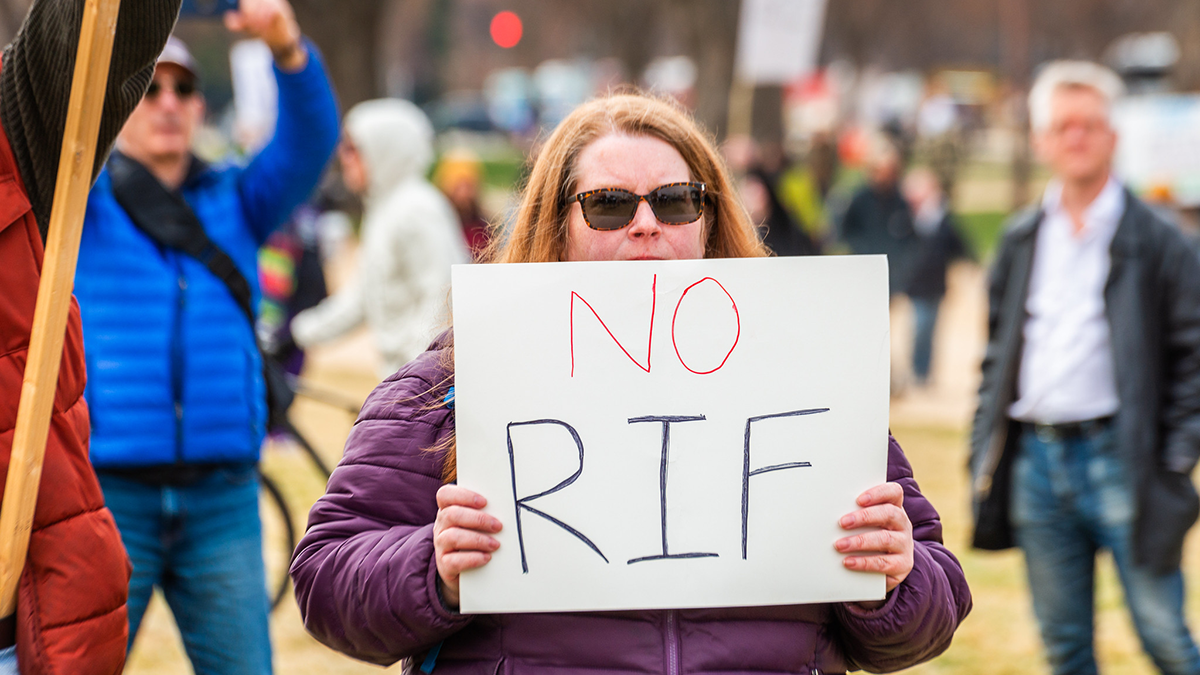Research & Developments is a blog for brief updates that provide context for the flurry of news regarding law and policy changes that impact science and scientists today.
A judge has announced that the government cannot issue further reduction-in-force (RIF) notices to federal employees because of the government shutdown, nor implement RIFs that had already been issued during the shutdown.
The ruling by U.S. District Judge Susan Illston will mark the latest in a months-long court battle over RIFs at federal agencies.
“I think it’s important that we remember that, although we are here talking about statutes and administrative procedure and the like, we are also talking about human lives, and these human lives are being dramatically affected by the activities that we’re discussing this morning,” Judge Illston said at the top of the hearing, which was held at the headquarters of the Northern District of California in San Francisco.
Related
• Judge pauses shutdown layoffs at more than 30 federal agencies
•White House threatens layoffs — not furloughs — if the government shuts down
• Mass Firing of Probationary Federal Employees Was Illegal, Judge Rules
• Judge rules that probationary federal workers were fired illegally — AGU’s plaintiff coalition prevails
The case, American Federation of Government Employees, AFL-CIO v. United States Office of Personnel Management (OPM) (3:25-cv-01780), was first filed in February. AGU joined as a plaintiff in the case in March. Other plaintiffs include Climate Resilient Communities, the Coalition to Protect America’s National Parks, and the American Public Health Association.
Judge Illston granted a temporary restraining order earlier this month, which prevented the government from executing RIFs during the shutdown until further notice.
However, the Trump administration only paused some RIFs, arguing that most of the thousands of layoffs announced since the shutdown are not covered by the court order.
As part of the temporary restraining order, the court ordered the government to provide an accounting of “all RIFs, actual or imminent,” that it planned to execute during the shutdown. The list included 143 Fish and Wildlife Service employees, 355 USGS employees, 272 National Park Service employees, and 474 Bureau of Land Management employees.
On 22 October, Judge Illston broadened the reach of who was protected by the temporary restraining order by adding several unions representing federal employees as plaintiffs.
In today’s hearing, the plaintiffs argued for a preliminary injunction, a move that essentially preserves the status quo before the final judgement of a trial. Danielle Leonard, an attorney representing the plaintiffs, argued that, in this case, the state of affairs prior to the government shutdown should be considered the “status quo.” In essence, this meant seeking for a halt to RIFs that have occurred since the shutdown, not just future RIFs.
The plaintiffs sought prove that the RIFs were “arbitrary or capricious,” a legal standard that is part of the Administrative Procedure Act, which governs how federal agencies operate.
Michael Velchick, an attorney representing the U.S. government, argued that the government’s actions were not only not arbitrary or capricious, but good policy, and “the right thing to do.”
“Morally it’s the right thing to do, and it’s the democratic thing to do,” he said. “The American people selected someone known above all else for his eloquence in communicating to employees that, ‘You’re fired.’”
This was seemingly a reference to the president’s former reality TV show, The Apprentice.
Leonard argued that Velchick’s statement was offensive to the 1.5 million federal employees represented by her clients. She summed up the defendant’s argument like this:
“There is some general authority, and therefore that blesses the specific actions that are happening here for the reasons that the government has given, regardless of how poor those reasons are. And that’s just not the way the law works.”
Judge Illston seemed to agree, stating that the Office of Personnel Management and Office of Management and Budget were prohibited from issuing more RIF notices or implementing those already issued.
The judge noted that she will likely hold an evidentiary hearing to settle a potential dispute over whether specific RIF notices were issued because of the shutdown, or were “already in the works” and unrelated to the shutdown.
—Emily Gardner (@emfurd.bsky.social), Associate Editor
These updates are made possible through information from the scientific community. Do you have a story about how changes in law or policy are affecting scientists or research? Send us a tip at [email protected].


